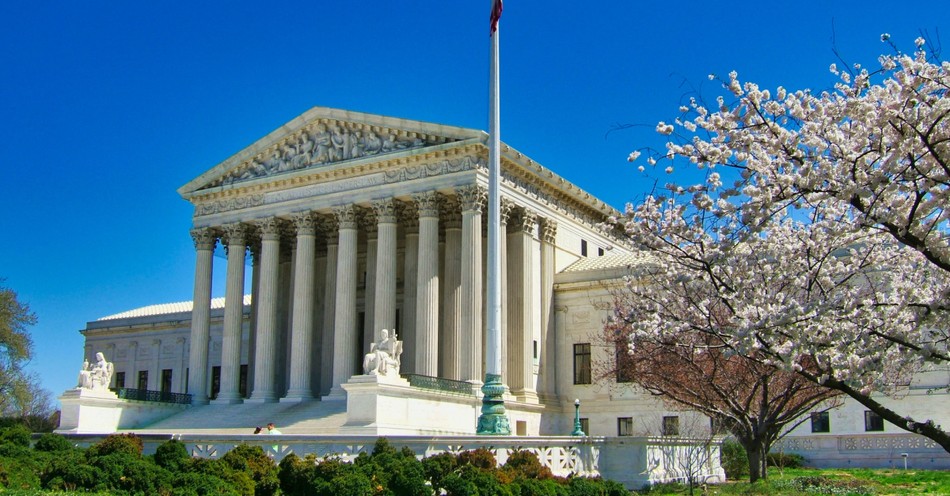On Friday, the Supreme Court delivered a smashing victory for free speech. Lorie Smith is the founder of 303 Creative, a graphic design company that, among other services, creates custom websites for weddings. Concerned that a Colorado law would force her to design websites for same-sex weddings or take on other projects that would violate her deeply held religious beliefs, Smith filed a pre-enforcement challenge, asking the court to weigh in on whether the law violated her freedom of speech and conscience.
The state decided that Lorie did not have the right to choose which messages she uses her talents to express. It even forbade her, for example, from posting a notice on her website stating she is unable to create websites that express messages contrary to her Christian beliefs, including websites that promote abortion services, celebrate same-sex marriages, or advance a transgender ideology. In July 2021, the 10th Circuit Court of Appeals ruled against Smith and for the state of Colorado.
Friday, on the last day of the 2023 docket, the U.S. Supreme Court reversed that decision and ruled in favor of Lorie Smith. Writing for the majority, Justice Neil Gorsuch, explained:
The First Amendment’s protections belong to all, not just to speakers whose motives the government finds worthy. In this case, Colorado seeks to force an individual to speak in ways that align with its views but defy her conscience about a matter of major significance…. Consistent with the First Amendment, the Nation’s answer is tolerance, not coercion. The First Amendment envisions the United States as a rich and complex place where all persons are free to think and speak as they wish, not as the government demands. Colorado cannot deny that promise consistent with the First Amendment.
Kristen Waggoner, general counsel for Alliance Defending Freedom who argued the case before the Court, described the win in a press release:
This is a win for all Americans. ... The government should no more censor Lorie for speaking consistent with her beliefs about marriage than it should punish an LGBT graphic designer for declining to criticize same-sex marriage. If we desire freedom for ourselves, we must defend it for others.
It’s not yet clear what implications this decision will hold for others, such as Colorado cake artist Jack Phillips, who are being forced to choose between their businesses and their deeply held religious beliefs. However, unlike the 2018 Masterpiece Cakeshop case, this decision was far broader and clearly dealt with questions of speech, conscience, and government coercion. In the Masterpiece case, the Supreme Court smacked down the state of Colorado for showing clear and extensive animus toward Jack’s faith. The state civil rights commission responded by not only showing similar animus again, but by also allowing and enabling another citizen to harass Jack Phillips, beginning on the same day that Jack’s first case was approved to be heard by the Supreme Court, and continuing today.
Already, voices as significant as dissenting Supreme Court justices and major media outlets have reported that, in the 303 Creative decision, the Court has allowed business owners to refuse service for LGBTQ people. That is simply not true. In fact, Justice Gorsuch specifically said as much in his majority opinion.
Justice Sonia Sotomayor, however, repeated that falsehood anyway before articulating a revisionist history of LGBTQ rights. For example, she repeated falsehoods about the murder of Matthew Shepard, wrongly claimed that the Colorado law did not affect Lorie Smith’s rights “in any meaningful sense,” and neglected the condition established by Smith that she would not refuse service to anyone because of their sexual orientation.
To the dissent, Justice Gorsuch retorted in the majority opinion, “It is difficult to read the dissent and conclude we are looking at the same case.”
Lorie Smith never asked for the right to refuse service to a particular group of people. She asked not to be forced to produce speech that she did not agree with. That’s what the Court affirmed on Friday. It is important that, whenever possible, all Americans who are concerned about the rights of conscience, including the freedom of speech, correct the falsehoods about this decision.
As Lorie Smith said in ADF’s press release,
This is a victory not just for me but for all Americans across our great country—for those who share my beliefs and for those who hold different beliefs. Whether you’re an LGBT graphic designer, a Jewish calligrapher, an Atheist speechwriter, or a pro-life photographer, the government shouldn’t force any of us to say something we don’t believe. I love people and work with everyone, including those who identify as LGBT. For me, it’s always about what message is requested, never the person requesting. I hope that, regardless of what people think of me or my beliefs, everyone will celebrate that the court upheld the right for each of us to speak freely.
Congratulations to ADF and to Lorie Smith.
This Breakpoint was co-authored by Dr. Heather Peterson. For more resources to live like a Christian in this cultural moment, go to breakpoint.org.
Publication date: July 3, 2023
Photo courtesy: Christopher Ryan/Unsplash
John Stonestreet is President of the Colson Center for Christian Worldview, and radio host of BreakPoint, a daily national radio program providing thought-provoking commentaries on current events and life issues from a biblical worldview. John holds degrees from Trinity Evangelical Divinity School (IL) and Bryan College (TN), and is the co-author of Making Sense of Your World: A Biblical Worldview.
The views expressed in this commentary do not necessarily reflect those of CrosswalkHeadlines.
BreakPoint is a program of the Colson Center for Christian Worldview. BreakPoint commentaries offer incisive content people can't find anywhere else; content that cuts through the fog of relativism and the news cycle with truth and compassion. Founded by Chuck Colson (1931 – 2012) in 1991 as a daily radio broadcast, BreakPoint provides a Christian perspective on today's news and trends. Today, you can get it in written and a variety of audio formats: on the web, the radio, or your favorite podcast app on the go.




